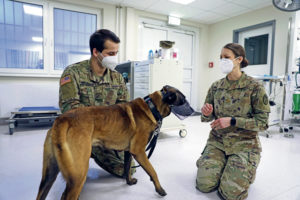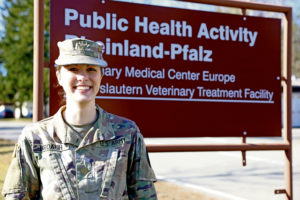
Each March, during Women’s History Month, the U.S. Army celebrates the important contributions of women to our nation. Women serve in every career field in the Army and are critical members of the Army team.
Maj. Desireé Broach is currently filling a unique role in the military.
Broach is the director of Veterinary Medical Center Europe on Pulaski Barracks in Kaiserslautern, but also the only board-certified veterinary behaviorist in the Army.
Broach’s journey to her current position began as a teenager when she participated in a work release program with her high school.
“The first day at the vet it just kind of clicked and I knew that’s what I wanted to continue to do,” she said.
Broach eventually applied to the University of Georgia with the help of the Health Professionals Scholarship Program, a three-year full-tuition scholarship offered by the Army for veterinary students attending an American Veterinary Medical Association accredited school.

“My dad is retired Navy and my brother was Reserve Officers’ Training Corps and then joined the National Guard,” explained Broach. “Joining the military was a family legacy. Plus if they could do it, I knew I could.”
About 18% of the total Army is currently women.
At her initial duty station at Moody Air Force Base, Georgia, Broach had over 30 military working dogs under her care. She found the majority of concerns or issues that she was treating were related to behavior.
“I found that really interesting,” said Broach.
Broach then applied for a behavioral residency through the military.
“It was the first time it was being offered and I was fortunate to receive it,” she said. “That’s where I specialized in studying animal behavior.”
In order to assess the underlying problem in an animal, she has to know species-specific behavior.
“Obviously we have a little bit of a different patient load then on the human side,” said Broach. “We can’t get a verbal recollection from the animal of what’s going on but behavioral health is very similar to human behavioral health.”
VMCEs mission is to provide comprehensive veterinary care to Military Working Dogs. Similar to the care Landstuhl Regional Medical Center provides to injured service members, VMCE is a Role 3 hospital for Military Working Dogs that are evacuated from a combat theater or distant duty site.
“Whether it’s fear, anxiety, or phobia, we do historically have a caseload of dogs that have exhibited symptoms of post-traumatic stress disorder in our working dog population,” said Broach.
Broach has seen a reduction in the number of cases that have come through VMCE but PTSD in MWDs is still a concern and “just kind of depends on the individual dog, the circumstances, and the level of care they receive.”
Veterinary behaviorists are scarce in the military.
Since 2017, when Broach became the first active-duty behaviorist in the Army, one other resident has been trained and a third will begin training this fall. She hopes that the Army continues to see value for training specialists in veterinary behavioral health.
MWDs are essential to the military and fill several mission critical roles. Therefore, it is important to provide them the best care as possible.
“It’s an important and equally unique opportunity for the military to now be able to offer Veterinary Corps Officers and MWD Handlers training in animal behavior and welfare,” said Broach.
According to Broach, veterinary behaviorists are present at less than half of the U.S. veterinary colleges and MWD Handler training does not include canine behavior topics.
The treatment that the animals receive is very specific to their needs. Treatment can be in the form of supportive care to provide them with coping mechanisms, medication, enrichment or social engagement with their handlers.
“Trauma can be tied to being in a combat zone or they could’ve been involved in an actual blast,” explains Broach. “Depending on the animal’s perception of what that trauma caused, the treatment will be different.”
Behavioral health is not only available at VMCE to MWDs, but also to privately owned animals.
“We seek to provide the best service to the community that we can within the constraints of meeting our mission requirement of providing full care to MWDs,” says Broach.
VMCE provides veterinary medical care to the regionally aligned MWDs, eligible pets in the Kaiserslautern Military Community on a space-available basis, as well as referral cases from across Europe, Africa and the Middle East.
For more information, follow “Veterinary Medical Center Europe” on Facebook.


